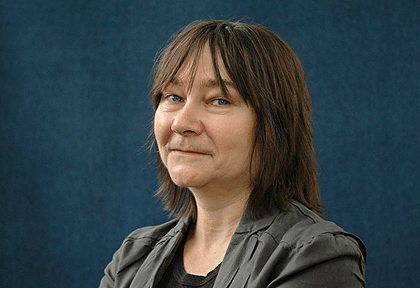@ Edinburgh International Book Festival, Sunday 16th August, Baillie Gifford Main Theatre @ 11.45
Forget about writing such predictably odious things like systematic, formulaic, and orderly, when trying to critique Ali Smith‘s work, because those aforementioned arbitrary and boring words are way off the mark. Pragmatic, anomalous, and divergent would be more apposite. Her prose lifts off the page like a dream – plunging you into her idiosyncratic, symbolic, and metaphorically concise syntax. Her books stand out from the rest – inimitable and exclusive.
When Smith first broke onto the scene in Nineteen ninety five, with Free Love and other stories – awarded the Saltire first book of the year award – it was instantly obvious that she wasn’t just a new voice, but a distinctly melodious writer: Someone who would write what she wanted, how she wanted. The English language is littered with superlatives, but perhaps we need to invent a few more to describe Ali Smith, because she’s that good.
A Scottish novelist, short-story writer, and Playwright – she has a list of literary awards that require more than two hands to enumerate. Outwith this, her literary presence has also continuously graced the Booker Prize short-list. Most notably for the Hotel World ( Encore Award, Scottish Arts Council Award ), a novel packed with literary allusions and cunning devices, and The Accidental (Winner Whitbread Novel Of the Year ), successfully negotiating the twin perils of overwriting and underwriting a twelve year old girl. Surprisingly, however, this particular prize has always eluded her. Perhaps it’s getting to a stage where having not awarded it to certain writers simply tarnishes the judges reputation – asking serious questions about the identity of the award itself, and whether it has ‘ a certain type ‘ of novel it looks for, as opposed to ‘ the best ‘ novel. Maybe they are afraid to give it to the novels that really deserve it, because in today’s society ‘ one must be seen to be evolving with the times ‘.
Ali Smith’s event at this years Edinburgh International Book Festival – Chaired by Stuart Kelly, and promoted as One of Scotland’s Finest Writers – is about her latest book ‘How to Be Both’ ( Winner Baileys Women’s prize for fiction, the Folio Prize, the Goldsmiths Prize, and the Costa Book Awards and also on the Booker Prize shortlist). Simply categorising this piece of work as just a novel, would be disappointingly naïve. It’s more like an invention. A work of art. A seminal example of how the world changes, but people tend to stay the same; confused, curious, and fascinatingly observational. This dazzling dual-narrative, about a troubled teenager, and an Italian Fresco painter is so rich, so subtly astute, that at times it doesn’t feel like you’re reading a novel, but fixed in a paroxysm , staring at a Rembrandt painting, drifting in and out of tears and awe, reverence for the beauty of the words lifting off the page and sticking to your skin. Smith doesn’t just write poetically, she is a poet. Rembrandt died in sixteen sixty nine, but many people still use the phrase ‘ It’s like a Rembrandt ‘. This work of art is so timeless, so perfectly constructed, that it might just possibly be the best novel ever written. It’s not a Rembrandt – it’s a Smith.
